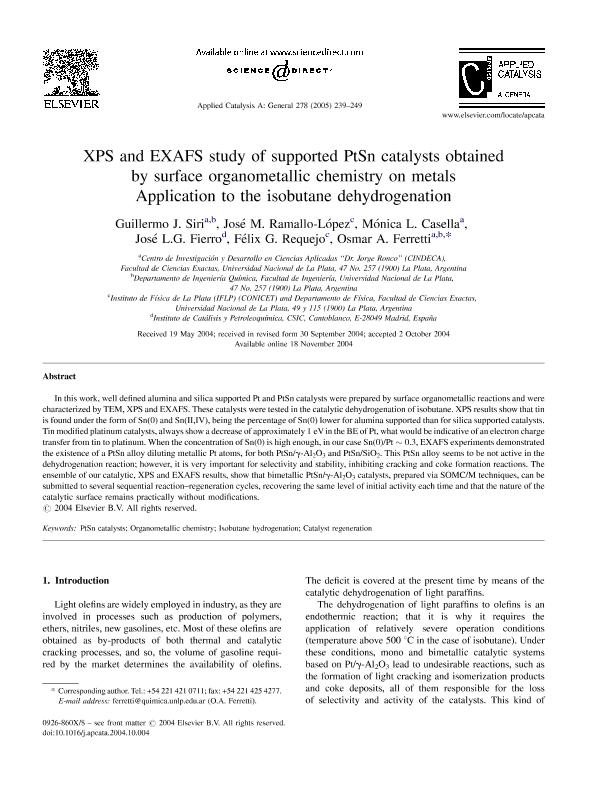Artículo
XPS and EXAFS study of supported PtSn catalysts obtained by surface organometallic chemistry on metals: Application to the isobutane dehydrogenation
Siri, Guillermo Jorge ; Ramallo Lopez, Jose Martin
; Ramallo Lopez, Jose Martin ; Casella, Mónica Laura
; Casella, Mónica Laura ; García Fierro, José Luis; Requejo, Felix Gregorio
; García Fierro, José Luis; Requejo, Felix Gregorio ; Ferretti, Osmar Alberto
; Ferretti, Osmar Alberto
 ; Ramallo Lopez, Jose Martin
; Ramallo Lopez, Jose Martin ; Casella, Mónica Laura
; Casella, Mónica Laura ; García Fierro, José Luis; Requejo, Felix Gregorio
; García Fierro, José Luis; Requejo, Felix Gregorio ; Ferretti, Osmar Alberto
; Ferretti, Osmar Alberto
Fecha de publicación:
10/01/2005
Editorial:
Elsevier Science
Revista:
Applied Catalysis A: General
ISSN:
0926-860X
Idioma:
Inglés
Tipo de recurso:
Artículo publicado
Clasificación temática:
Resumen
In this work, well defined alumina and silica supported Pt and PtSn catalysts were prepared by surface organometallic reactions and were characterized by TEM, XPS and EXAFS. These catalysts were tested in the catalytic dehydrogenation of isobutane. XPS results show that tin is found under the form of Sn(0) and Sn(II,IV), being the percentage of Sn(0) lower for alumina supported than for silica supported catalysts. Tin modified platinum catalysts, always show a decrease of approximately 1 eV in the BE of Pt, what would be indicative of an electron charge transfer from tin to platinum. When the concentration of Sn(0) is high enough, in our case Sn(0)/Pt ∼ 0.3, EXAFS experiments demonstrated the existence of a PtSn alloy diluting metallic Pt atoms, for both PtSn/γ-Al2O3 and PtSn/SiO2. This PtSn alloy seems to be not active in the dehydrogenation reaction; however, it is very important for selectivity and stability, inhibiting cracking and coke formation reactions. The ensemble of our catalytic, XPS and EXAFS results, show that bimetallic PtSn/γ-Al2O3 catalysts, prepared via SOMC/M techniques, can be submitted to several sequential reaction–regeneration cycles, recovering the same level of initial activity each time and that the nature of the catalytic surface remains practically without modifications.
Archivos asociados
Licencia
Identificadores
Colecciones
Articulos(CINDECA)
Articulos de CENTRO DE INV EN CS.APLICADAS "DR.JORGE J.RONCO"
Articulos de CENTRO DE INV EN CS.APLICADAS "DR.JORGE J.RONCO"
Articulos(IFLP)
Articulos de INST.DE FISICA LA PLATA
Articulos de INST.DE FISICA LA PLATA
Citación
Siri, Guillermo Jorge; Ramallo Lopez, Jose Martin; Casella, Mónica Laura; García Fierro, José Luis; Requejo, Felix Gregorio; et al.; XPS and EXAFS study of supported PtSn catalysts obtained by surface organometallic chemistry on metals: Application to the isobutane dehydrogenation; Elsevier Science; Applied Catalysis A: General; 278; 2; 10-1-2005; 239-249
Compartir
Altmétricas



